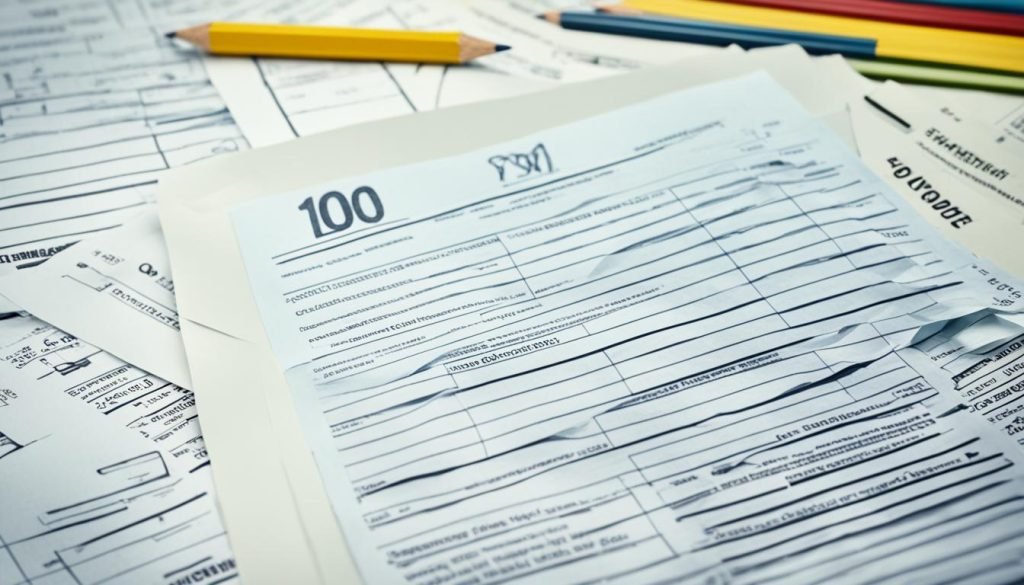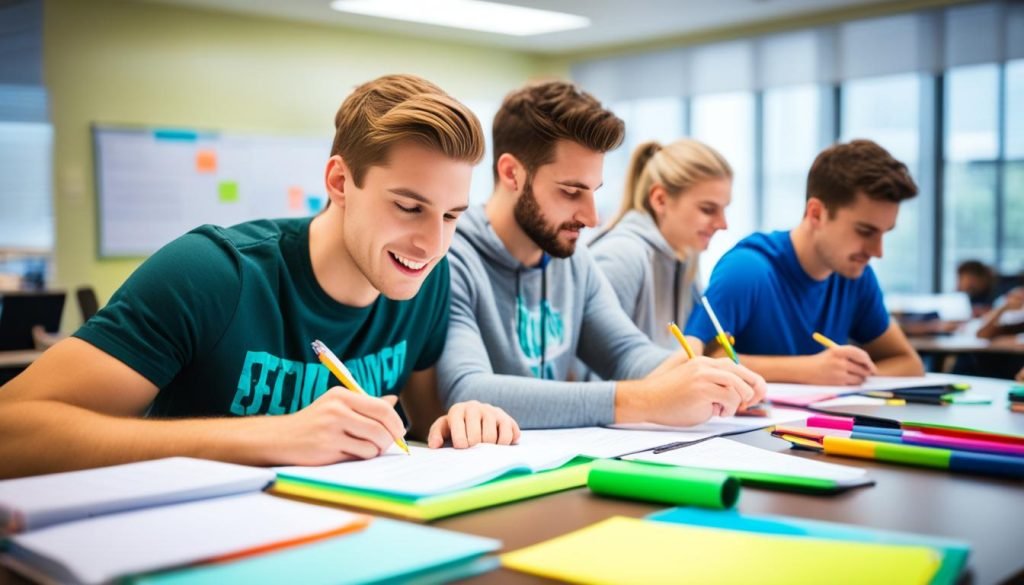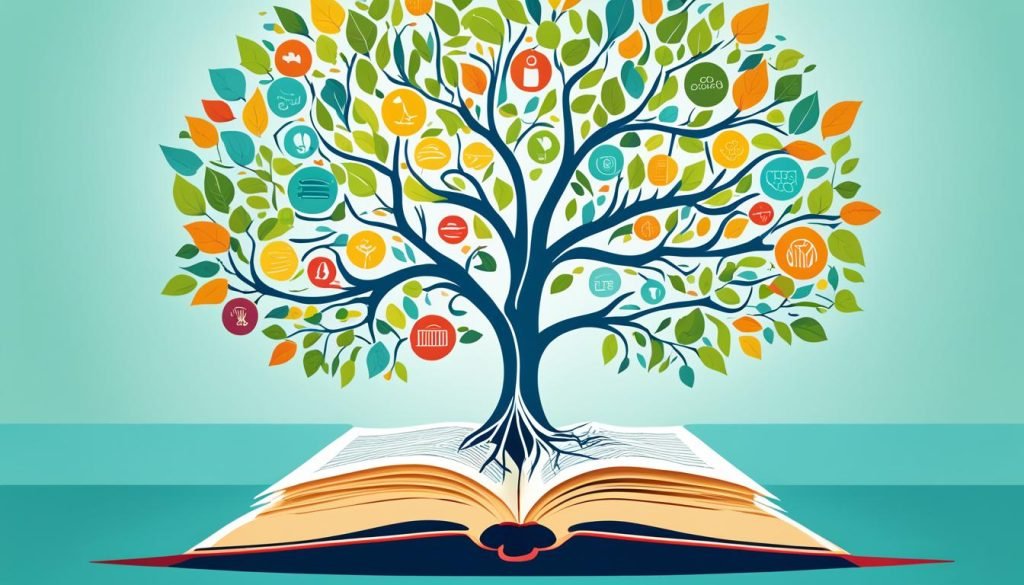In Singapore, primary exams are key to a student’s future. They check how well students are doing and help find what they need to work on. They also get students ready for what comes next. For parents, teachers, or students, these primary exams can really help in doing well in school.

Key Takeaways
- Getting primary exams in Singapore gives useful insights into how students are doing and helps them grow.
- Practicing with these exams helps students get better at managing time and solving problems.
- Using online tools and getting help can make preparing for exams even better.
- Creating a good place to study and celebrating wins can keep students motivated to keep getting better.
- Thinking of learning as a lifelong journey is key to staying ahead in school.
Unlocking Academic Success: The Importance of Primary Exams
In Singapore, primary exams are key to checking how students are doing and getting ready for harder school challenges. These educational assessments show what a child is good at and where they need to get better. This helps teachers and parents make better plans for student assessment.
Assessing Student Progress
Primary exams in Singapore check if students know the primary education stuff. By using test resources and exam preparation stuff, students get more confident, learn to solve problems, and understand their subjects better. These exams show where they need to work harder.
Preparing for Future Learning Challenges
Primary exams in Singapore also help students get ready for harder school later on. By practicing with primary exams, students learn important skills and knowledge. This helps them do well in educational assessments and harder school stuff. It makes moving to secondary school easier and helps them do well in the long run.
“The true purpose of education is to cultivate the whole person, not just to accumulate facts and figures.”
By seeing the value of primary exams, students in Singapore can reach their full potential. With focused practice and a positive attitude, they can overcome any learning challenge.
Mastering the Curriculum: Singapore's Primary Education System
Singapore’s primary education is known for its tough curriculum and focus on doing well in school. Students face standardized exams in key subjects like Math, Science, and English. Knowing what’s expected helps parents and students get ready for the school challenges.
Primary education in Singapore lays a strong base for later learning. Kids start school at six and go for six years. They learn many subjects, including:
- Mathematics
- Science
- English
- Mother Tongue Language (Chinese, Malay, or Tamil)
- Humanities
- Physical Education
- Art and Music
Students must pass standardized exams throughout primary school. The big exam is the Primary School Leaving Examination (PSLE) at the end of Primary 6. This exam is key for getting into secondary school and affects their future studies.
| Exam | Purpose | Grade Levels |
|---|---|---|
| Primary School Leaving Examination (PSLE) | Assess academic progress and determine secondary school placement | Primary 6 |
| Semestral Assessments | Evaluate student performance and provide feedback | Primary 1 to Primary 6 |
| End-of-Year Examinations | Measure student mastery of the curriculum | Primary 1 to Primary 6 |
Knowing about Singapore’s primary education helps students and parents. It prepares them for school and builds important skills. This strong system gets kids ready for what’s next.
For students and parents in Singapore, finding good exam materials is key. There are many resources out there to help students do well in school. You can find past papers, practice tests, and worksheets to help you get ready for exams.
Past Year Papers
Past year papers are very useful for primary school students. They show what questions and formats you might see in exams. Practicing with these papers helps students understand the curriculum better and get better at solving problems.
FamilyTutor.sg has a lot of past year papers for different subjects at all primary levels. These papers are updated to match the latest curriculum, so students are ready for the real exams.
Practice Tests and Worksheets
Practice tests and worksheets are also great for students. They help make sure you understand important topics and find areas you need to work on. Websites like SgTestPaper.com and Geniebook have lots of these materials for various subjects and levels.
These resources help students see how they’re doing and improve their skills. Skills like managing time, solving problems, and thinking critically are important. Practicing with these materials often helps students feel ready for their exams.
| Grade Level | Subjects Available | Test Papers and Exam Papers |
|---|---|---|
| Primary 1 | Chinese, English, Higher Chinese, Mathematics | Terms 1-3, Term 4/SA2/EOY |
| Primary 2 | Chinese, English, Higher Chinese, Mathematics | Terms 1-3, Term 4/SA2/EOY |
| Primary 3 | Chinese, English, Higher Chinese, Mathematics, Science | Terms 1-3, Term 4/SA2/EOY |
| Primary 4 | Chinese, English, Higher Chinese, Mathematics, Science | Terms 1-3, Term 4/SA2/EOY |
| Primary 5 | Chinese, English, Higher Chinese, Mathematics, Science | Terms 1-3, Term 4/SA2/EOY |
| Primary 6 | Chinese, English, Higher Chinese, Mathematics, Science | Terms 1-3, Term 4/SA2/EOY |
These exams, whether past papers or practice tests, are great for students. They help improve learning and get ready for success in school. Using these materials often helps students get better at what they need to do.
“The more you practice, the more confident you’ll become. These downloadable exams are the key to unlocking your full potential.”
Boosting Confidence: The Benefits of Practicing with Downloaded Exams
Downloading primary exams can really help students. It makes them more confident and improves their grades. By using practice tests, students learn what they’re good at and what they need to work on. This helps them study smarter and manage their time better.
Identifying Strengths and Weaknesses
Doing exam prep helps students see where they’re strong and where they need to get better. Knowing this is key to making a good study plan. It helps them use their time well and do their best on exams.
Developing Time Management Skills
Practicing with downloaded exams also makes students better at managing their time. They learn to pace themselves and handle the pressure of timed tests. This way, they’re ready for the tough questions on real exams.
Using downloaded exams does more than just raise grades. It prepares students for harder challenges ahead. It gives them the confidence and skills they need to succeed in school.
“Practicing with downloaded exams has been a game-changer for my child’s academic progress. It has not only boosted their confidence but also helped them identify and address their weaknesses. I highly recommend this approach to any parent or student looking to excel in their studies.”
With practice tests and student assessments, students can reach their full potential. This approach sets them up for success in school for a long time.
Leveraging Technology: Online Resources for Exam Preparation
Today, students have many online tools to help with exam prep. These tools can make learning more fun and personal. They work well with downloadable materials.
Interactive practice tests are great for exam prep. They let students get used to the exam feel. Students can check their answers right away and see where they need to work harder.
Online study guides and assessments are also super helpful. They explain important topics and give tips for the exam. With these tools, students can understand their subjects better and feel ready for exams.
There are many online resources to help with studying. Students can find blogs, videos, and simulations online. These make learning fun and give new insights.
“Integrating online resources into your exam preparation can make the learning process more dynamic and effective. Students who leverage these technological tools often see significant improvements in their academic performance.”
It’s important for students to use online resources for exam preparation and educational assessments. These tools open up new ways to learn and help students do well in school.
To do well in exams, students should be open to new ways of learning. Using both online and downloadable materials can help students reach their goals. This approach makes learning fun and helps students do their best in school.
Getting ready for exams is more than just memorizing stuff. It’s also about making a study space that helps you focus, stay productive, and stay motivated. By using smart study habits and getting the right help, students can do their best and pass their exams.
Establishing a Routine
Having a regular study plan is key. When students set aside time just for studying and stick to it, their brains get better at learning. Here are some tips for a good study routine:
- Choose a special time and place for studying, away from distractions.
- Break big tasks into smaller bits to avoid getting too tired.
- Take regular breaks to rest and refresh your mind.
- Make sure to get enough sleep, eat well, and stay active.
Seeking Support and Guidance
Studying alone is important, but using the help and knowledge around you is also key. Teachers, tutors, or experts can give you great advice and help you learn better. Here are some ways to get support:
- Talk often with teachers to know what they want and where you can get better.
- Work with tutors or study groups to share ideas, ask questions, and learn more.
- Use online groups, blogs, or workshops to help your studying.
- Talk to counselors or advisors to make a good study plan.
By making a good study space and getting the right help, students can get the skills, confidence, and toughness they need to do well in exams and later on.

“Good study habits are the base of doing well in school. With some effort and the right advice, students can reach their full potential.”
| Study Tips | Learning Environment | Exam Preparation | Student Assessments |
|---|---|---|---|
| Establish a consistent routine | Minimize distractions | Practice with past year papers | Identify strengths and weaknesses |
| Take regular breaks | Maintain a comfortable workspace | Develop time management skills | Seek feedback from teachers |
| Incorporate healthy habits | Leverage online resources | Collaborate with study groups | Monitor progress over time |
Celebrating Achievements: Motivating Students Along the Way
In primary education, it’s key to celebrate students’ wins to keep them motivated. By praising their hard work and progress, we make a positive space for learning. This boosts student motivation, academic success, and love for primary education.
One great way to celebrate is with rewards and recognition. Think about a “Student of the Month” program at school. Honoring top students with certificates or small gifts lifts their confidence and pride.
Teachers can also celebrate in fun ways, like:
- Showing off student art or projects in the classroom or school
- Having a “Talent Show” for students to share their skills
- Planning special trips or activities for good grades or behavior
Even small celebrations can deeply motivate and engage students with their learning.
Parents are key in celebrating kids’ wins too. By praising their efforts and helping set goals, parents boost their kids’ self-worth. This leads to better academic success and a stronger commitment to learning.
“Celebrating every milestone, no matter how small, is the key to nurturing a child’s love for learning and ensuring their long-term student motivation. “
Together, parents, teachers, and the community can make a big difference in students’ academic success and happiness. By creating a positive, encouraging space, we inspire students to aim high and reach their full potential.
Staying Ahead of the Curve: Continuous Learning and Growth
Primary education is just the start of a lifelong journey of learning. It’s key to teach students the value of always learning and adapting. This helps them do well in school and get ready for the future’s changes.
In our fast-changing world, learning and adapting are key skills. By embracing lifelong learning, students get the resilience and agility to face new challenges. This mindset makes them curious and open, letting them learn new things and grow in their educational growth.
“The more that you read, the more things you will know. The more that you learn, the more places you’ll go.” – Dr. Seuss
Primary education sets the stage for a lifetime of learning and discovery. But success is really about adapting and doing well in a changing world. By teaching students to love learning and explore new things, they’re set for ongoing educational growth and reaching their goals.
Cultivating a Curious Mindset
Teach students to see their primary education as full of wonder and curiosity. Make a place where they can ask questions, explore, and think differently. This helps them do better in school and prepares them for future challenges.
- Promote active engagement in classroom talks and teamwork.
- Encourage activities outside class that help them learn new things.
- Give them chances to follow their interests and learn on their own.
Embracing Continuous Growth
Learning isn’t just in the classroom or during primary school. Show students that their education is a lifelong journey of growth and finding themselves. By teaching them to always learn, you help them become resilient and adaptable for a changing world.
- Help them set goals for learning outside of school.
- Show them different ways to learn, like books, online courses, workshops, and mentors.
- Celebrate their wins and achievements, making them proud of their lifelong learning path.

By encouraging a love for continuous growth and facing new challenges, students can get the skills and mindset to lead in their education and life.
In this guide, we looked at the key resources for Singapore students aiming to do well in their primary exams. These exams help track progress and prepare for the future. They open the door to success.
The Singapore education system values mastering the curriculum. Downloadable primary exams are a key tool for students to check their knowledge and find areas to improve. By practicing with past papers and different tests, students get more confident, manage their time better, and understand their subjects better.
Technology helps students find many online resources for exam prep. Also, creating a good study space, sticking to a study plan, and getting help from teachers and friends helps students reach their full potential. This keeps them ahead in school.

